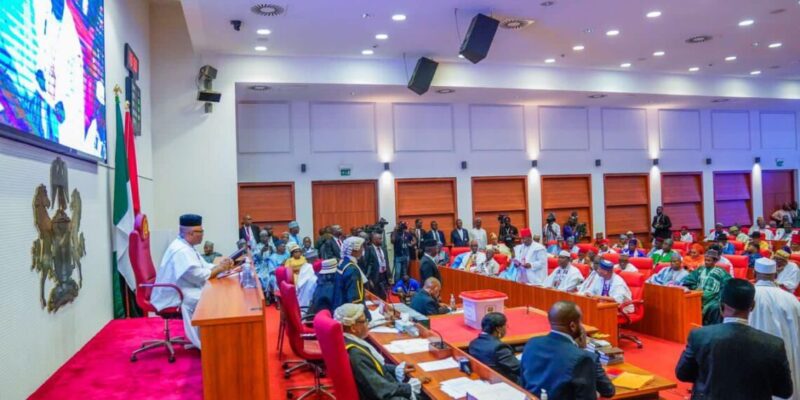Breaking News
University Lecturers Demand Living Wage as Senators Allegedly Earn Over 30 Times More
According to current figures, a professor in a federal university earns about N633,333 monthly. However, following a recent wage increase announced by Imo State Governor, Senator Hope Uzodimma, professors at Imo State University now earn N812,000 monthly—making them among the highest-paid lecturers in the country.

University lecturers across Nigeria are once again gearing up for confrontation with the Federal Government over what they describe as a grossly inadequate salary structure—especially when compared to the pay of public office holders, such as senators.
There are currently three recognized academic staff unions in Nigerian universities: the Academic Staff Union of Universities (ASUU), the Congress of University Academics (CONUA), and the Medical and Dental Consultants’ Association of Nigeria (MDCAN). Despite their differences, they are united in insisting that their current earnings are unsustainable.
According to current figures, a professor in a federal university earns about N633,333 monthly. However, following a recent wage increase announced by Imo State Governor, Senator Hope Uzodimma, professors at Imo State University now earn N812,000 monthly—making them among the highest-paid lecturers in the country.
In stark contrast, lawmakers reportedly earn significantly more. While the Revenue Mobilization, Allocation and Fiscal Committee (RMAFC) officially places senators’ salaries at about N1 million per month, former senator Shehu Sani revealed that actual take-home earnings—including allowances—amounted to N13.5 million monthly during his tenure. He added that current members of the 10th Senate now earn up to N21 million monthly.
Sani, during an interview on Channels TV, accused RMAFC of “being economical with the truth.” He said:
“I was a senator and I believe I had correct knowledge about what actually happened at that time and I believe it is what is happening now… The RMAFC was just playing with figures… They are being economical with the truth.”
He added that another senator, Kawu Ismaila, had confirmed the N21 million monthly figure.
These revelations have sparked outrage from many Nigerians, who argue that the disparity shows the nation’s undervaluing of education. The Founder of the Concerned Parents and Educators Network, Mrs. Yinka Ogunde, wrote on social media:
“I owe all lecturers an apology. I never knew a Prof earns less than 600k, less than a local govt councillor. We need an Education rethink.”
Another commentator pointed out the irony of professors—who typically spend over a decade attaining a PhD and completing peer-reviewed work—earning far less than politicians, some of whom require only SSCE (WAEC/NECO) qualifications to become senators.
He wrote:
“It will take a person about 10 years from 100 Level to become a PhD holder… Yet, they earn N633,333 per month. What does it take to become a Nigerian senator? SS3 WAEC results!”
Others have also connected the low lecturer salaries to the modest fees paid by students in Nigerian public universities. Ayobami Adeyinka noted:
“How much were you expecting a Prof to earn when school fee is N75,000 per session? These things are connected and interwoven.”
By contrast, he pointed out that in the UK, professors earn around £80,000 annually, while students pay about £9,500 per year, often through government-backed loans.
Lecturers Speak Out
The National President of CONUA, Dr. Niyi Sunmonu, noted that university salaries have remained largely stagnant since 2009, despite inflation and rising cost of living:
“Salary has remained stagnant since 2009… What they have been doing is mere tokenism. Lecturers deserve living wage. We are not beggars.”
He also emphasized that negotiations on lecturers’ welfare must include all recognized staff unions, in line with ILO Convention 98, the Trade Union Act, and the 1999 Constitution.
ASUU, through its UNILAG Branch Chairman Prof. Idou Keinde, echoed similar sentiments during a protest on campus. He criticized the Federal Government’s approach of offering loan schemes for lecturers instead of fulfilling overdue entitlements:
“If we are paid living wage and if all our allowances are paid as expected, who would want to go borrowing money?”
Demands and Potential Strike
The lecturers’ core demands remain largely unchanged since the 2009 Agreement, which includes:
- Adequate funding for universities
- Improved teaching and learning facilities
- Cessation of indiscriminate creation of new universities
- Payment of Earned Academic Allowances
- Annual N200 billion revitalization funds
- A living wage for lecturers
Although former President Goodluck Jonathan released N200 billion as revitalization funds before leaving office, successive administrations have failed to fully implement the 2009 agreement.
ASUU has warned that it may resort to strike action if these issues are not urgently addressed.
Meanwhile, more states are adjusting their minimum wage, with Ebonyi State Governor Francis Nwifuru recently raising the figure from N70,000 to N90,000.
As the wage disparity between Nigerian academics and politicians widens, public frustration grows, and pressure mounts on the Federal Government to take meaningful action.










